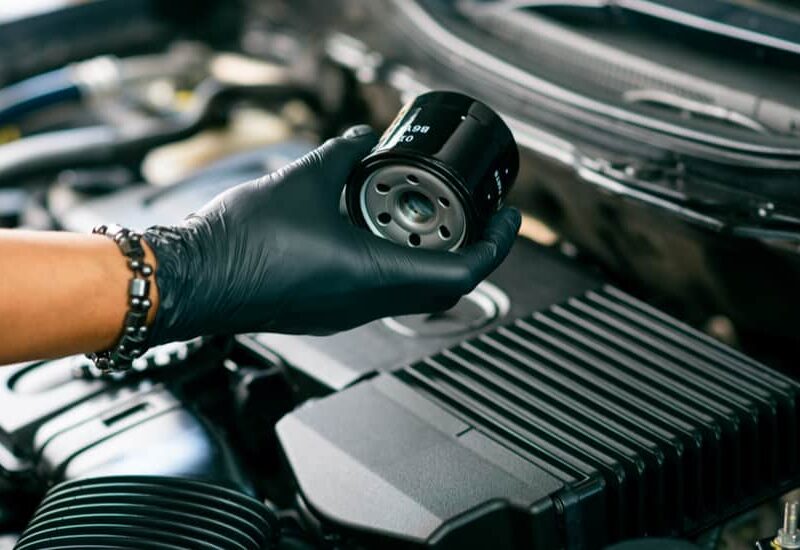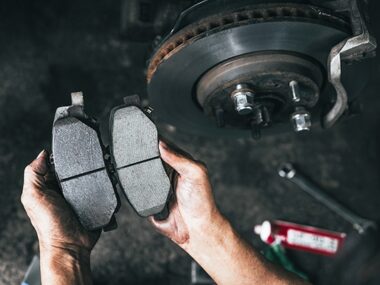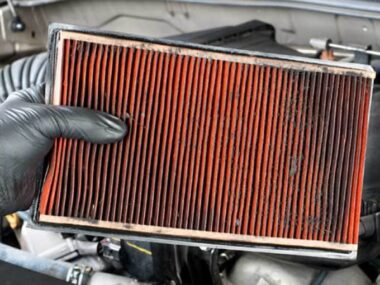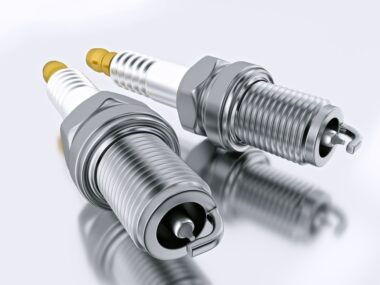The Enormous Role of the Oil Filter in Your Vehicle
The oil filter is a vital component of your vehicle’s engine, designed to keep the engine oil clean by removing contaminants and impurities. As engine oil circulates through the engine, it picks up dirt, metal particles and other debris that can cause wear and tear on the engine components.
The oil filter’s job is to trap these harmful particles, allowing only clean oil to flow back into the engine. This ensures that the engine remains lubricated and protected, which is crucial for maintaining optimal performance and longevity.
Regular maintenance of the oil filter is essential to avoid potential engine problems. Over time, the oil filter can become clogged with accumulated debris, reducing its effectiveness and potentially leading to poor oil flow. This can result in increased engine wear, reduced fuel efficiency and even engine damage if not addressed promptly.
Replacing the oil filter as part of routine oil changes helps ensure that your engine runs smoothly and efficiently, preventing costly repairs and extending the life of your vehicle.
As engine oil circulates through the engine, it picks up dirt, metal particles and other debris that can cause wear and tear on the engine components. The oil filter’s job is to trap these harmful particles, allowing only clean oil to flow back into the engine. This ensures that the engine remains lubricated and protected, which is crucial for maintaining optimal performance and longevity.
Regular maintenance of the oil filter is essential to avoid potential engine problems. Over time, the oil filter can become clogged with accumulated debris, reducing its effectiveness and potentially leading to poor oil flow.
This can result in increased engine wear, reduced fuel efficiency and even engine damage if not addressed promptly. Replacing the oil filter as part of routine oil changes helps ensure that your engine runs smoothly and efficiently, preventing costly repairs and extending the life of your vehicle.
Why the Oil Filter Matters
Imagine your engine as a complex machine with hundreds of moving parts. These parts generate friction, which, in turn, produces heat. The engine oil lubricates these components, reducing friction and preventing overheating. However, as the oil circulates through the engine, it picks up grime and debris. The oil filter catches these impurities before they can cause harm, ensuring that the oil remains clean and effective.
How the Oil Filter Works
The oil filter operates by channeling the engine oil through a filter media. This media is typically made from paper, synthetic materials or a combination of both. As the oil passes through the filter, contaminants are trapped, allowing only clean oil to continue circulating through the engine.
Most oil filters also have a bypass valve to ensure oil flow if the filter becomes clogged.
Types of Oil Filters
When it comes to choosing an oil filter, there are several types to consider:
- Mechanical Oil Filters: These are the most common type. They use a filter element to physically trap contaminants.
- Magnetic Oil Filters: These filters incorporate magnets to attract and capture metal particles from the oil.
- Cartridge Oil Filters: These filters come in a replaceable cartridge form and are typically used in newer vehicles.
- Bypass Oil Filters: Designed to provide additional filtration, these filters operate alongside the main oil filter for extra protection.
Choosing the Right Oil Filter
Selecting the right oil filter for your vehicle is crucial. Consult your vehicle’s owner’s manual or a trusted mechanic to find the appropriate filter for your specific make and model. The right oil filter will ensure that your engine receives the best possible protection and performance.
Replacing the Oil Filter
Regular oil filter replacement is essential for maintaining engine health. Most mechanics recommend changing the oil filter every time you change the oil, which is typically every 3,000 to 5,000 miles. However, this can vary based on your driving habits and the type of oil you use.
The Oil Filter Change Process
Changing the oil filter involves several steps:
- Prepare Your Vehicle: Ensure your vehicle is on a level surface and the engine is cool. Gather the necessary tools and a new oil filter.
- Drain the Old Oil: Place an oil pan under the engine and remove the drain plug to let the old oil drain out.
- Remove the Old Oil Filter: Locate the oil filter and use an oil filter wrench to remove it. Be prepared for some residual oil to spill.
- Install the New Oil Filter: Apply a small amount of oil to the gasket of the new filter and screw it into place. Make sure it’s snug but not over-tightened.
- Refill the Engine Oil: Replace the drain plug, add new oil and check the oil level with the dipstick.
- Check for Leaks: Start the engine and let it run for a few minutes. Check for any leaks around the oil filter and drain plug.
Signs That Your Oil Filter Needs Attention
It’s important to monitor your oil filter for signs that it may need replacement. Here are some indicators:
- Engine Noise: If you notice unusual engine noise, it could be a sign that the oil filter is clogged.
- Low Oil Pressure: A drop in oil pressure may indicate a problem with the oil filter.
- Oil Leaks: Leaking oil around the filter could suggest a faulty or improperly installed filter.
The Impact of a Dirty Oil Filter
A dirty or clogged oil filter can have several negative effects on your engine:
- Reduced Oil Flow: A clogged filter restricts oil flow, which can lead to poor lubrication and overheating.
- Engine Wear: Contaminants in the oil can cause increased wear and tear on engine components.
- Decreased Performance: Dirty oil can affect engine performance, leading to reduced fuel efficiency and power.
The Evolution of Oil Filters
Oil filters have evolved significantly over the years. Early filters were basic and less efficient, but modern filters are highly advanced, offering better filtration and longer service life. Advances in filter media and construction materials have improved the effectiveness of oil filters, providing better protection for today’s high-performance engines.
Eco-Friendly Oil Filter Options
With growing environmental awareness, many manufacturers now offer eco-friendly oil filters. These filters are designed to be more recyclable and have less environmental impact. If you’re concerned about your carbon footprint, consider opting for an eco-friendly option next time you replace your oil filter.
DIY vs. Professional Oil Filter Change
Changing the oil filter is a task that many car owners choose to do themselves. It can be a cost-effective and rewarding way to take care of your vehicle. However, if you’re not comfortable performing the task or lack the necessary tools, a professional mechanic can ensure the job is done correctly.
The Bottom Line
The oil filter may be a small component, but it plays a monumental role in your vehicle’s engine health. Regular maintenance, including timely oil filter changes, is essential for ensuring your engine runs smoothly and efficiently. By understanding the function of the oil filter and paying attention to signs of wear or clogging, you can help extend the life of your engine and keep your vehicle performing at its best.
In conclusion, the oil filter is a critical part of your engine’s maintenance routine. By prioritizing its care and understanding its role, you can help prevent costly repairs and keep your vehicle running smoothly for years to come.
Frequently Asked Questions
How often should I change my oil filter?
It’s generally recommended to change the oil filter every time you change your engine oil, typically every 3,000 to 5,000 miles. However, this can vary based on your vehicle’s make, model and driving conditions. Always consult your owner’s manual for specific guidelines.
Can I change the oil without changing the oil filter?
Technically, you can change the oil without replacing the oil filter, but it’s not advisable. The old filter may be clogged with debris, which can reduce oil flow and lead to engine damage. For optimal engine health, it’s best to replace the oil filter with every oil change.
What are the signs of a clogged oil filter?
Common signs include unusual engine noises, a drop in oil pressure or oil leaks around the filter. If you notice any of these symptoms, it’s important to check and possibly replace your oil filter as soon as possible.
Are all oil filters the same?
No, oil filters come in various types and sizes, each designed for specific vehicles and engines. It’s important to choose the correct oil filter for your car, as using the wrong one can lead to improper filtration and potential engine damage.
What happens if I don’t change the oil filter?
Failing to change the oil filter can result in a buildup of contaminants in the engine oil, which can lead to poor lubrication, increased engine wear and reduced performance. Over time, this can cause serious engine damage and costly repairs.






